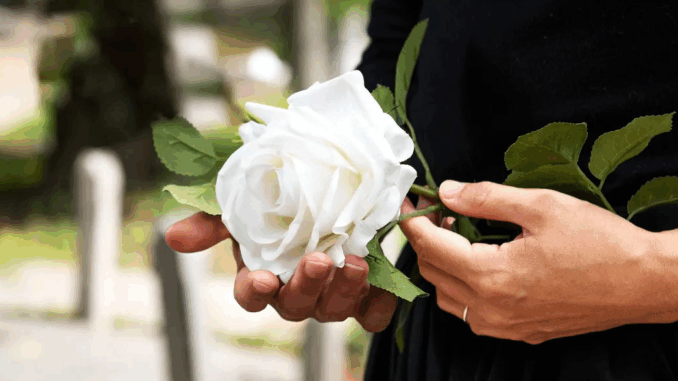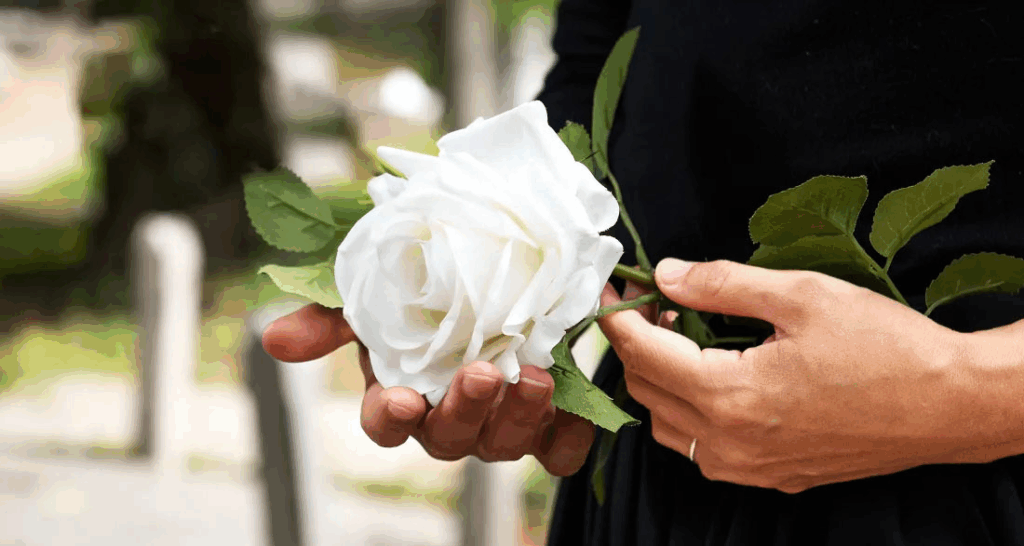

Whispers of Truth
The sound of dirt falling on the coffin was soft, but each thud felt like a hammer against my chest.
I swayed on my feet. If Linda hadn’t been holding my arm—warm and steady—I might’ve fallen right there, onto the wet, muddy ground of the cemetery.
The priest was still talking, but his voice got swallowed up by the wind. People came and went. Some I hadn’t seen in years. They hugged me, spoke to me, but it was all a blur. I couldn’t focus on any of them.
All I could see was that coffin.
All I could think was: Emily is in there.
My baby girl. Eighteen years old. She had her whole life ahead of her.
Her college brochures were still scattered on her desk. She had scribbled little notes in the margins. There was even a spreadsheet open on her laptop—the last thing she had worked on before she left us. She wanted to be a veterinarian.
“They can’t tell you what hurts, Mom. I want to learn how to listen anyway,” she used to say, eyes full of passion.
But now, the house was painfully quiet. No more laughter in the kitchen. No more music drifting out from her room. No more sound of her desk chair scraping the floor when she danced around doing homework.
The house felt like a heart without a beat.
David stood beside me during the burial. His black suit was perfectly ironed, his tie straight, his back stiff like a soldier. His face didn’t change—no tears, no emotion, nothing. It was like he was just performing.
But I wasn’t surprised. That emotional distance had been there for years. We had grown apart in silence, until we were just two people living under the same roof, pretending.
On the drive back home, I leaned my head against the cold window and watched the world rush by like a grey watercolor painting. I had cried so much my throat hurt, but now… I couldn’t cry anymore. I was empty.
David cleared his throat and said, “Shay, we should stop by the donation center. I want to check their hours. Linda said she’ll go ahead and set out the food for the guests. I told her to do it in the backyard.”
I turned to him slowly. “What for?”
“I think we should start boxing up Emily’s things,” he said calmly. “While it’s still fresh. If we wait, they’ll just sit untouched for years.”
My heart pounded. “Are you serious right now, David?”
“The longer we hold onto the past, the harder it’ll be to move forward,” he said, looking straight ahead. “It’s like ripping off a Band-Aid. Fast is better.”
I shook my head, stunned. “My child was just buried. Can you at least wait one day?”
He didn’t answer.
When we reached home, it hit me like a wave: Emily would never come running down the hallway again. She’d never kick off her sneakers and yell, “What’s for snacks, Mom?” That part of my life was gone.
I walked into the hallway… and froze.
There were boxes.
Lined up neatly, stacked along the wall.
Each one had labels written in David’s sharp, neat handwriting:
Donate. Toss. Keep.
My stomach dropped.
“When did you do this?” I asked in shock.
“This morning, when you were at the funeral home,” he said. “I couldn’t just sit still, Shay. I needed to do something.”
I stared at the boxes. I couldn’t breathe.
It felt like I had walked into a stranger’s house. Like Emily had never existed here. It was as if grief had become a task—something to pack up and throw away by the weekend.
I said nothing. I just walked upstairs, into the bathroom, locked the door, and sank onto the edge of the tub.
I buried my face in my hands.
The sobs weren’t loud, but they tore through me, deep and strong. My body shook with the pain. I stayed there while people knocked and called out.
I ignored everything.
That night, when the house was finally quiet, I tiptoed to Emily’s room. The door creaked like it didn’t want to let me in.
Her bed was unmade. A hoodie lay at the foot. Her biology book was open to a highlighted page. I sat down slowly, like she might still need the space.
I touched her clothes one by one, folding them gently. It felt like touching her again.
Her pillow still smelled like her shampoo. Her wall was covered in Polaroid photos—her friends, our dog Max, and selfies with me. We were laughing in every single one.
“I miss you, baby,” I whispered. “I miss you so much.”
Then I saw her backpack, slouched in the corner like it was waiting for school.
I unzipped it slowly. Inside were notebooks, pens, little things that now felt like treasures. But tucked inside her history book, I found a folded piece of paper.
I opened it.
“Mom, if you’re reading this, look under my bed. You’ll understand everything.”
Emily’s handwriting. I stopped breathing. My fingers were trembling.
I dropped to the floor and reached beneath the bed, brushing past dust until I found a black cardboard box. It was heavy.
I sat back and lifted the lid.
Inside were photos… and a voice recorder.
The first photo punched the air out of my lungs: David, smiling with a woman I didn’t recognize. Her arm was around his waist. He looked happy.
Next photo: David again, holding a toddler.
The little boy had Emily’s same big brown eyes.
“No…” I whispered.
Inside the envelope were more photos—screenshots of bank transfers, hotel receipts, jewelry store invoices. And they were all dated over the past seven years.
Seven.
I pressed play on the voice recorder, and Emily’s voice came through. Calm. Shaky.
“Dad, why do you have another family?”
David’s voice answered, “It’s complicated, Emily… I love you both. But yes, I have another family. And it wasn’t a mistake. I’ve supported them for years. But you can’t tell your mom. She doesn’t need to know.”
Emily’s voice cracked. “You lied to her. You lied to me. You told me those kids were your coworker’s. Remember the bakery that summer? I saw you with them. Why would you lie to your own daughter?”
Click. The recording ended.
I stared at the photos, my hands trembling. All I could think about was the night she died.
Three nights ago. Her car slipped off the road. The police said it was hydroplaning. But Emily had driven that road a hundred times.
And that recording… it was from that same night.
Was she crying while she drove?
I heard slow footsteps on the stairs. David.
He stepped into the room, but I didn’t speak. I held up the recorder.
His face drained of all color.
“You were going to throw her things away,” I said quietly. “Because you knew she had this.”
He looked frozen.
“Shay,” he whispered, stepping closer. “Please. I can explain.”
“She knew. Emily knew. And she confronted you.”
His legs gave out. He dropped to his knees.
“I didn’t touch her car,” he said quickly. “I swear to you, Shay. I never wanted her to die. She found out and I panicked. I begged her not to tell you. I told her I’d fix it. And then she… she was gone.”
He sobbed. But I didn’t cry. I didn’t scream.
I just looked at him with a calm I didn’t expect.
“I thought if I erased her things, I wouldn’t have to feel the guilt,” he said quietly. “Everything in this house reminds me of what I did.”
I didn’t answer.
I just walked out.
The next morning, I filed for divorce.
I sat at the kitchen table—Emily’s table—and signed every page.
I kept every one of Emily’s things. Every photo. Every note.
And then I mailed copies of the photos and voice recordings to David’s other family.
No letter. No explanation.
Just the truth.
Because they deserved to know. Just like I had.
David now lives alone. Paying support to two families who will never trust him again.
And me?
Some nights, I sit in Emily’s room. I hold her hoodie and listen to her last message. I breathe in her scent and close my eyes.
Even in death, my daughter gave me the truth.
And that truth set me free.
A month after the funeral, Linda came by. She didn’t ring the doorbell. She walked in softly with her spare key.
She found me sitting on the floor in Emily’s room, her hoodie in my lap, the window open just enough to let in the breeze.
Linda sat beside me quietly. She didn’t say anything at first. Just held my hand.
“I don’t know how to do this,” I whispered.
“I know,” she said gently. “You don’t have to. Just breathe.”
“I’m scared that if I let it out… I’ll break.”
“Then break,” she said, her eyes glassy. “I’ll be here. When your grief is loud and when it’s silent.”
A tear rolled down my cheek.
“There are no words for this pain,” she added softly. “But maybe she’s still here. In the sunrise. In the flowers. In the music. In the way the wind moves through this room.”
I leaned my head on her shoulder.
And for the first time in days, I let myself cry—really cry.
No more hiding. No more pretending.
Just two women, in the quiet room of a girl who was gone from sight…
but never, ever gone from love.
Để lại một phản hồi